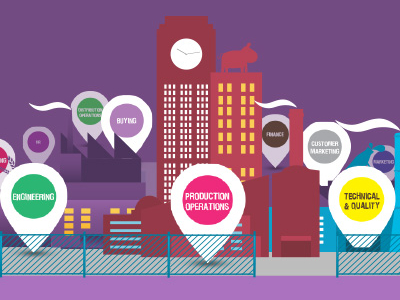What’s it all about then?
As a PR Executive specialising in food and drink you could be working as part of a client account team in an external agency that concentrates on the industry or within an in-house department of a major food manufacturer and food brand owner.
If you work as PR Executive within a small or medium-sized business, you will probably act as support to the Head of PR or PR Manager within a very small team and responsible for all public relations and external communications activity.
Depending on your experience, you may undertake general PR administration and organisation around day-to-day PR activity or get involved in researching and writing news releases.
In a larger business, you may be more specialised and be expected to handle a wider variety of, often very high profile, tasks as part of a larger PR, marketing or corporate communications team spanning areas like Media Relations, Public Affairs, Events, City & Financial PR, Digital Media etc.
The general rule is the smaller the organisation, the more varied your daily remit and the more opportunity you’ll get to use and develop your professional PR knowledge.
What might I be doing?
Your primary role will be to assist the PR team to concentrate on their core areas of focus and expertise. This might include providing research on current industry news, producing progress reports linked to return on investment in PR budgets, analysing online or print news clippings, distributing news releases, providing data on website hits and often, managing social media and social media analysis in partnership with more experienced staff.
As PR Executive, you are the oil that allows the rest of the company machine to run effectively and efficiently by having all information and reports instantly at hand and up to date and events like product launches, exhibitions and client tours running sweetly.
You can expect a very varied working day with lots of different projects and priorities to juggle and ample opportunity to develop the skills and knowledge you’ll need to progress to PR Manager or, in external agencies, PR Account Manager.
What will be expected of me?
As a PR Executive, you will need to be highly organised and ready and willing to take on sometimes mundane but necessary tasks in support of the team as well as being capable of ‘stepping up’ and taking on often highly complex, high profile tasks.
You will have great written English skills, be articulate and confident and exude a can-do attitude no matter what’s thrown at you. You will have a wide general knowledge, be well read and always up to date with the latest news – from the tabloids to the broadsheets and online.
You will have great computer skills and be a regular user of digital and social media, with an excellent grasp of the capabilities and business and marketing uses of all online platforms.
What can I expect?
Working in an agency, you can expect to work long hours – often in an environment where work-life and life-outside-work are totally inter-twined. But shine and you can find yourself offered the opportunity to take on greater responsibility and promoted quickly.
Working in-house, you can expect more regular hours and a more structured career progression as well as far greater job security.
Done well, the role of PR Executive can result in great job satisfaction. You’ll have a high profile within the organisation and often externally.
What qualifications do I need to get in?
A PR Executive will usually be expected to have a degree in a related subject.
While many people now enter PR via a PR or Media Studies degree, a degree in English, Business, or Marketing is often more attractive. A good course will offer industry placements. If yours doesn’t, make sure you arrange your own around your studies. PR is highly competitive and good work experience counts.
Being confident, having a nose for news, establishing good relationships with people at all levels, being articulate and having strong writing skills are the basis for this role – as is excellent general knowledge and an interest in everything from the business pages to celebrity culture.
Most people start in PR at as a PR Executive and work up to become PR Manager as their experience and track record of achievement grows.
What about further training?
You could look at postgraduate professional courses in marketing and communications from organisations such as the Chartered Institute of Public Relations (CIPR) or Chartered Institute of Marketing.
Anything else I might need to know?
Yup – start now. Write a blog. Create a vlog on YouTube via your own YouTube channel. Keep up to date with the latest mobile communication trends. Read the news every day.
Also job names are flexible in PR. As a PR Manager you may be expected to undertake a Head of PR role and run a department or team or you could be a team member with far less responsibility. Take a close look at the salary and job description if you want to know where you are in the pecking order and what kind of job pressures you may have to face.
With enough relevant experience, there is always the opportunity for career and pay progression as a PR Manager. You could progress to the role of PR Director, or Head of PR, Marketing Manager or Brand Director - all of which involve making decisions about Sales and Marketing strategies, supervising staff and agencies and delegating tasks to other members of the team.
The skills required of a PR Manager are extremely transferable and allow employees to move on to many different senior jobs.
 cy
cy





